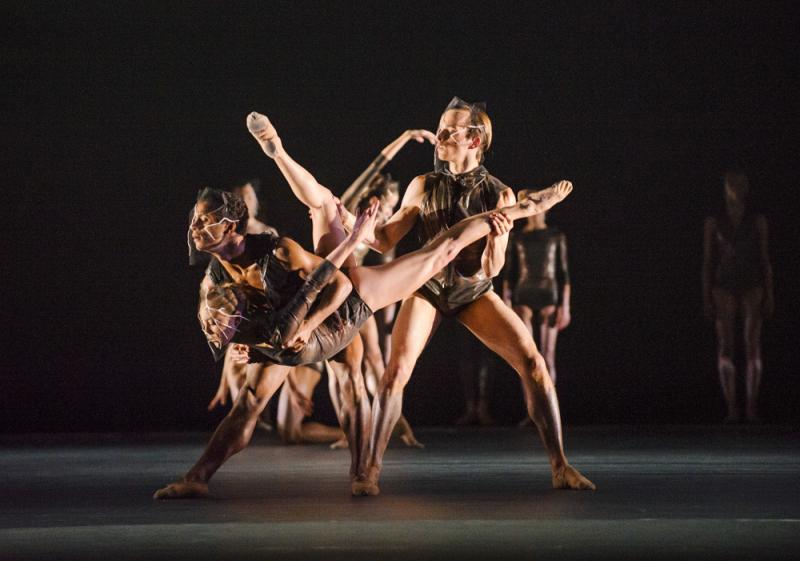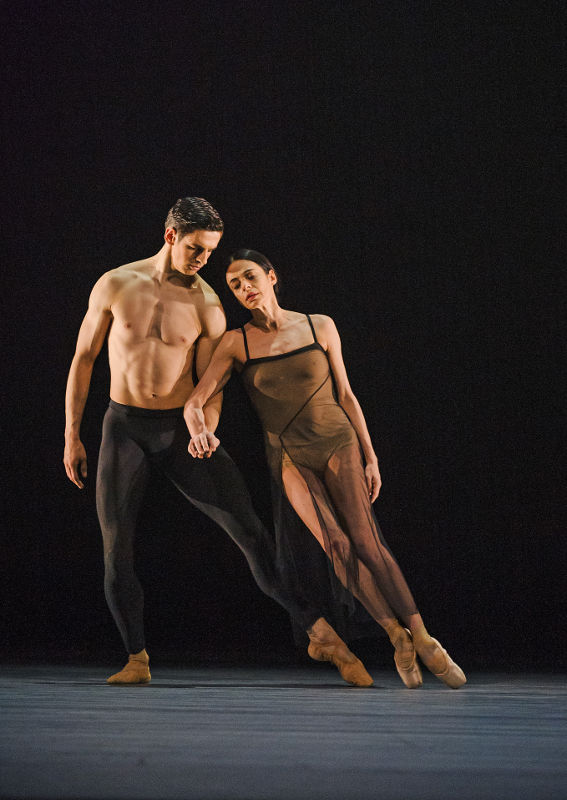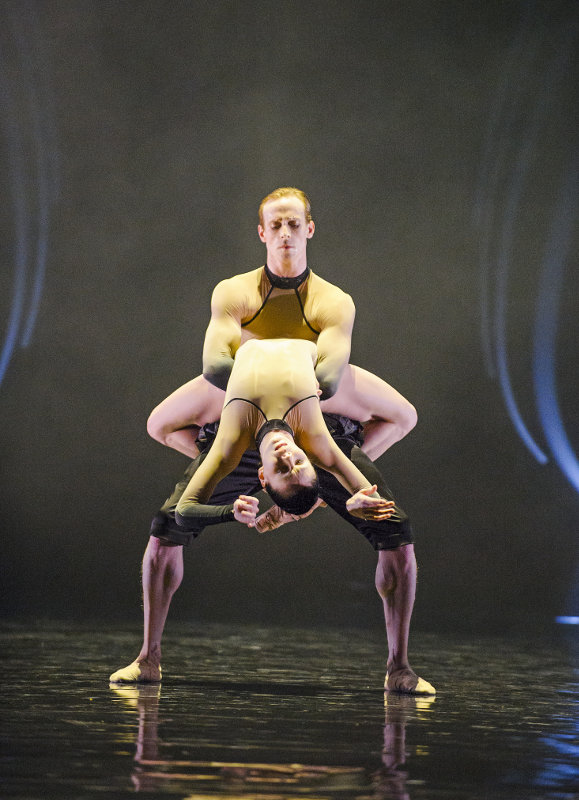Woolf Works, Wayne McGregor, Royal Ballet | reviews, news & interviews
Woolf Works, Wayne McGregor, Royal Ballet
Woolf Works, Wayne McGregor, Royal Ballet
Leaden score and ponderous choreography do an injustice to Bloomsbury author's name

On my way to the Woolf Works opening last night, I made the mistake of reading The Waves, Virginia Woolf’s most experimental novel.
Dance is almost certainly not the medium for Woolf, and even if it were, Wayne McGregor is not the choreographer for the job. He, his dramaturge, and the ROH marketing people will draw your attention to Woolf’s experimentation with form, her drive to make language do more, her attention to rhythm and impressions. They imply that these things connect her with McGregor, self-appointed bright-eyed crusader for new possibilities in dance. But Woolf’s experimentation took her to the heights of literary greatness, while in my opinion McGregor’s much-vaunted use of cognitive science and designy digital art collaborators turns out more cardboard every year: tasteless, space-filling pap, of which Woolf Works by virtue both of its extreme length and its travestying of the great author, is the pappiest yet. By now the McGregor fans in both the literal Opera House and the virtual review-reading house will be sputtering into their coffee, fumbling for the Comment button to tell me how intense, how mind-blowing, how deep it all was. So I’ll concede that yes, there were some good bits. They were: veteran ballerina Alessandra Ferri (pictured right), fetched out of retirement to lend her extraordinary, melancholy charisma to the role of Woolf in the first and third sections; Edward Watson’s entrance in I Now, I Then, flexing his magnificent shoulders as if trying on his skin for the first time; and the glacially slow-moving wave film in Tuesday. I will also hear representations on behalf of the nude-costumed, Baroque-sounding bit of Becomings and the hypnotic array of dancers at the end of Tuesday, though those were more temporary abatements of awfulness than eruptions of genius.
By now the McGregor fans in both the literal Opera House and the virtual review-reading house will be sputtering into their coffee, fumbling for the Comment button to tell me how intense, how mind-blowing, how deep it all was. So I’ll concede that yes, there were some good bits. They were: veteran ballerina Alessandra Ferri (pictured right), fetched out of retirement to lend her extraordinary, melancholy charisma to the role of Woolf in the first and third sections; Edward Watson’s entrance in I Now, I Then, flexing his magnificent shoulders as if trying on his skin for the first time; and the glacially slow-moving wave film in Tuesday. I will also hear representations on behalf of the nude-costumed, Baroque-sounding bit of Becomings and the hypnotic array of dancers at the end of Tuesday, though those were more temporary abatements of awfulness than eruptions of genius.
I do give McGregor credit for attempting in the first and third sections a kind of lyrical narrative choreography very different from his usual style, and when done by Ferri, these spacious arm gestures prove very affecting. But that's Ferri's talent, not McGregor's: in the hands of Beatriz Stix-Brunell, double-cast as the younger version of Mrs Dalloway in I Then, I Now, the same gestures are unbearably affected. And McGregor’s pas de deux remain execrably ugly: ungainly, unmusical grappling that reveals absolutely nothing about the characters doing it.
 Becomings, which puts a steampunk spin on Orlando’s time-travelling, looks more like conventional McGregor of recent years: dark lighting, a bare black stage, fancy lasers, and some of the best ballet dancers in the world wheeled on in gold costumes and made to tie themselves in knots. Reducing Steven McRae and Natalia Osipova (pictured left with Edward Watson) to their bendiness is a criminal waste: what about their musical intelligence, their dramatic power, to say nothing of their elite training in the absurdly difficult art form of classical ballet?
Becomings, which puts a steampunk spin on Orlando’s time-travelling, looks more like conventional McGregor of recent years: dark lighting, a bare black stage, fancy lasers, and some of the best ballet dancers in the world wheeled on in gold costumes and made to tie themselves in knots. Reducing Steven McRae and Natalia Osipova (pictured left with Edward Watson) to their bendiness is a criminal waste: what about their musical intelligence, their dramatic power, to say nothing of their elite training in the absurdly difficult art form of classical ballet?
Any risk of thrill or atmosphere is killed dead by Richter’s original score, which is orchestral chloroform from beginning to end. At best its repetitive chord figures are dull but inoffensive (though often sounding absurdly like one of these modern polyphonic phone ringtones); at worst it rises to absurd pitches of rumbling, drum-rolling bombast. The aural sabotage of the dance is particularly egregious in Tuesday, which is visually by far the most appealing of the three sections and might have been enjoyable had it been accompanied by something other than bland piano chords and a synthy warbling voice, like electronic windchimes. Virginia Woolf, who famously listened to Beethoven sonatas while writing The Waves, would be turning in her grave.
But even if you don’t know Woolf’s work, even if you have no investment in her literary talent, her fierce intelligence or the multi-sensory artistic fecundity of the Bloomsbury group, even if you don’t care a fig that they are being travestied by association, this is still an evening of bad music and bad ballet. Raven Girl, McGregor’s first foray into narrative ballet, showed anyone who had eyes to see how little suited he is to this medium. This bloated behemoth seems to me an inexcusably expensive way to drive the lesson home. Please, no more.
rating
Explore topics
Share this article
Add comment
The future of Arts Journalism
You can stop theartsdesk.com closing!
We urgently need financing to survive. Our fundraising drive has thus far raised £33,000 but we need to reach £100,000 or we will be forced to close. Please contribute here: https://gofund.me/c3f6033d
And if you can forward this information to anyone who might assist, we’d be grateful.

Subscribe to theartsdesk.com
Thank you for continuing to read our work on theartsdesk.com. For unlimited access to every article in its entirety, including our archive of more than 15,000 pieces, we're asking for £5 per month or £40 per year. We feel it's a very good deal, and hope you do too.
To take a subscription now simply click here.
And if you're looking for that extra gift for a friend or family member, why not treat them to a theartsdesk.com gift subscription?
more Dance
 Help to give theartsdesk a future!
Support our GoFundMe appeal
Help to give theartsdesk a future!
Support our GoFundMe appeal
 Romeo and Juliet, Royal Ballet review - Shakespeare without the words, with music to die for
Kenneth MacMillan's first and best-loved masterpiece turns 60
Romeo and Juliet, Royal Ballet review - Shakespeare without the words, with music to die for
Kenneth MacMillan's first and best-loved masterpiece turns 60
 Vollmond, Tanztheater Wuppertal Pina Bausch + Terrain Boris Charmatz, Sadler's Wells review - clunkily-named company shows its lighter side
A new generation of dancers brings zest, humour and playfulness to late Bausch
Vollmond, Tanztheater Wuppertal Pina Bausch + Terrain Boris Charmatz, Sadler's Wells review - clunkily-named company shows its lighter side
A new generation of dancers brings zest, humour and playfulness to late Bausch
 Phaedra + Minotaur, Royal Ballet and Opera, Linbury Theatre review - a double dose of Greek myth
Opera and dance companies share a theme in this terse but affecting double bill
Phaedra + Minotaur, Royal Ballet and Opera, Linbury Theatre review - a double dose of Greek myth
Opera and dance companies share a theme in this terse but affecting double bill
 Onegin, Royal Ballet review - a poignant lesson about the perils of youth
John Cranko was the greatest choreographer British ballet never had. His masterpiece is now 60 years old
Onegin, Royal Ballet review - a poignant lesson about the perils of youth
John Cranko was the greatest choreographer British ballet never had. His masterpiece is now 60 years old
 Northern Ballet: Three Short Ballets, Linbury Theatre review - thrilling dancing in a mix of styles
The Leeds-based company act as impressively as they dance
Northern Ballet: Three Short Ballets, Linbury Theatre review - thrilling dancing in a mix of styles
The Leeds-based company act as impressively as they dance
 Best of 2024: Dance
It was a year for visiting past glories, but not for new ones
Best of 2024: Dance
It was a year for visiting past glories, but not for new ones
 Nutcracker, English National Ballet, Coliseum review - Tchaikovsky and his sweet tooth rule supreme
New production's music, sweets, and hordes of exuberant children make this a hot ticket
Nutcracker, English National Ballet, Coliseum review - Tchaikovsky and his sweet tooth rule supreme
New production's music, sweets, and hordes of exuberant children make this a hot ticket
 Matthew Bourne's Swan Lake, New Adventures, Sadler's Wells review - 30 years on, as bold and brilliant as ever
A masterly reinvention has become a classic itself
Matthew Bourne's Swan Lake, New Adventures, Sadler's Wells review - 30 years on, as bold and brilliant as ever
A masterly reinvention has become a classic itself
 Ballet Shoes, Olivier Theatre review - reimagined classic with a lively contemporary feel
The basics of Streatfield's original aren't lost in this bold, inventive production
Ballet Shoes, Olivier Theatre review - reimagined classic with a lively contemporary feel
The basics of Streatfield's original aren't lost in this bold, inventive production
 Cinderella, Royal Ballet review - inspiring dancing, but not quite casting the desired spell
A fairytale in need of a dramaturgical transformation
Cinderella, Royal Ballet review - inspiring dancing, but not quite casting the desired spell
A fairytale in need of a dramaturgical transformation

Comments
Hanna might be better off
When I read reviews like
You use an opinion you don't
You use an opinion you don't like to attack writing (IMO) at the very highest level. Whether your specific points are valid or not, I don't know, and I haven't seen the ballet, but I do know that Max Richter's music is vapid in the extreme (watered-down ovaltine, to turn the previous commenter's words around), and that would be enough to put me off going in the first place. It's the very opposite of Virginia Woolf's nuanced writing, in short, of which Hanna clearly has knowledge. I wonder how many other dance critics could claim that. Besides, what would the editors - who do exist, of course - need to edit here?
It's for others to judge whether The Arts Desk is different from other 'online media' in fielding professional writers, but as a reader as opposed to a contributor I've always found it a cut above most and I value a dance critic, following very much in the footsteps of our peerless Ismene Brown, who's not afraid to step outside the stifling cliques and interest groups who populate that and other artistic worlds.For ill-informed reviews and poor style, go to Quentin Letts in the Daily Mail
I defer to no one in my
Thank you for your comments,
Thank you for your comments, Todd. Woolf Works has generated many strong opinions, and a passionate public and critical response to any artwork is a sign of art doing what it is supposed to do. I responded as critics are supposed to do: by giving an honest account of the piece as I experienced it. As The Arts Desk’s dance editor for around 18 months now, I have full confidence in my knowledge and judgement and don't feel I have to explain my writing to you.
But I do agree with you that we should all be concerned for the future of arts criticism, given the wholesale ejection of so many critics from the major newspapers in recent years. This is why The Arts Desk was founded and I am very glad you have the highest expectations of it. I went to Woolf Works with the highest of expectations too.
In my opinion the reviewer
Compare this to The Stage's
After deciding I would never